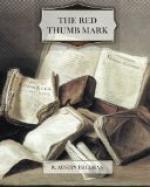“The case that I have to present to you, my lord and gentlemen of the jury,” he began in a clear, though unmusical voice, “is one the like of which is but too often met with in this court. It is one in which we shall see unbounded trust met by treacherous deceit, in which we shall see countless benefactions rewarded by the basest ingratitude, and in which we shall witness the deliberate renunciation of a life of honourable effort in favour of the tortuous and precarious ways of the criminal. The facts of the case are briefly as follows: The prosecutor in this case—most unwilling prosecutor, gentlemen—is Mr. John Hornby, who is a metallurgist and dealer in precious metals. Mr. Hornby has two nephews, the orphan sons of his two elder brothers, and I may tell you that since the decease of their parents he has acted the part of a father to both of them. One of these nephews is Mr. Walter Hornby, and the other is Reuben Hornby, the prisoner at the bar. Both of these nephews were received by Mr. Hornby into his business with a view to their succeeding him when he should retire, and both, I need not say, occupied positions of trust and responsibility.
“Now, on the evening of the ninth of March there was delivered to Mr. Hornby a parcel of rough diamonds of which one of his clients asked him to take charge pending their transfer to the brokers. I need not burden you with irrelevant details concerning this transaction. It will suffice to say that the diamonds, which were of the aggregate value of about thirty thousand pounds, were delivered to him, and the unopened package deposited by him in his safe, together with a slip of paper on which he had written in pencil a memorandum of the circumstances. This was on the evening of the ninth of March, as I have said. Having deposited the parcel, Mr. Hornby locked the safe, and shortly afterwards left the premises and went home, taking the keys with him.
“On the following morning, when he unlocked the safe, he perceived with astonishment and dismay that the parcel of diamonds had vanished. The slip of paper, however, lay at the bottom of the safe, and on picking it up Mr. Hornby perceived that it bore a smear of blood, and in addition, the distinct impression of a human thumb. On this he closed and locked the safe and sent a note to the police station, in response to which a very intelligent officer—Inspector Sanderson—came and made a preliminary examination. I need not follow the case further, since the details will appear in the evidence, but I may tell you that, in effect, it has been made clear, beyond all doubt, that the thumb-print on that paper was the thumb-print of the prisoner, Reuben Hornby.”
He paused to adjust his glasses, which were in the very act of falling from his nose, and hitch up his gown, while he took a leisurely survey of the jury, as though he were estimating their impressionability. At this moment I observed Walter Hornby enter the court and take up a position at the end of our bench nearest the door; and, immediately after, Superintendent Miller came in and seated himself on one of the benches opposite.




